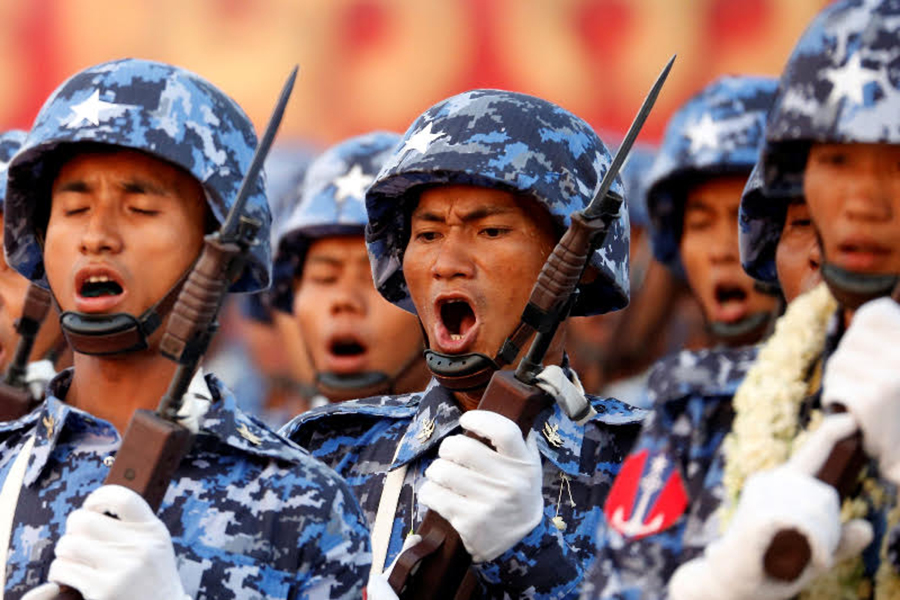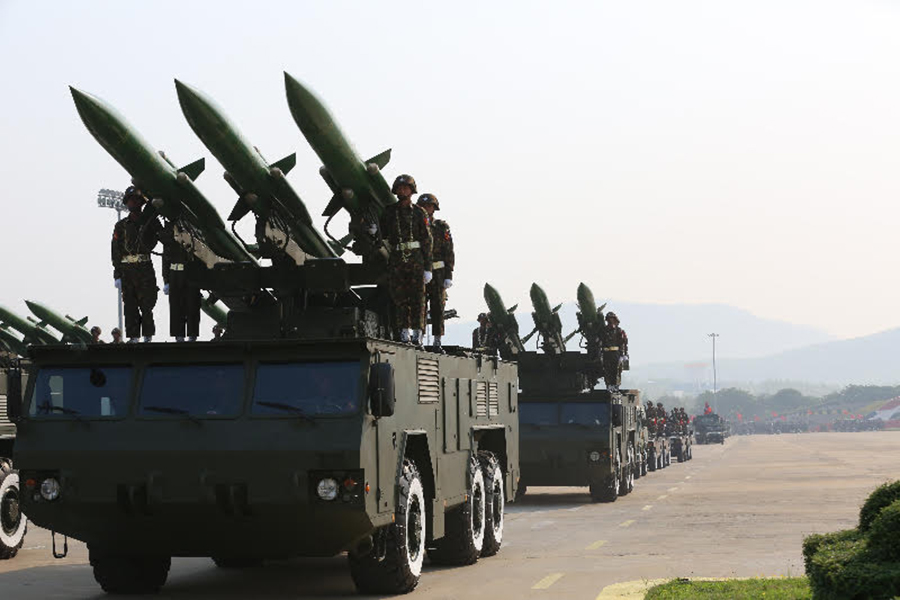Since he became commander-in-chief of the armed forces in 2011, Snr-Gen Min Aung Hlaing has given annual speeches on Armed Forces Day, which falls on March 27. As with his predecessors, his speeches have tended to be filled with references to building a modern armed force, repeatedly using the phrase “standard army” (while avoiding the term “professional army”) and reiterating promises to protect the military-drafted 2008 Constitution and safeguard the nation and its sovereignty. Every year he has also lashed out at “fascists” and “colonialists” and repeatedly invoked Myanmar’s independence struggle.
Interestingly, he has also talked about 21st century warfare technology, democracy and the Geneva Convention, and denied that ethnic cleansing or genocide has taken place in the country. He has firmly said that there are no ‘Rohingya’ in the country, insisting they are ‘Bengali immigrants.’
His speech tomorrow, which will mark the 73rd anniversary of the founding of the Tatmadaw, is being keenly awaited. Will he repeat the same rhetoric of previous years or will there be new intrigues and remarks?
Here some excerpts of his speeches since 2012.
2012
In his first speech as army chief to mark the 67th anniversary of the resistance against the Japanese during World War II, Snr-Gen Min Aung Hlaing said that the military had an obligation to defend the Constitution and that it would continue to take part in politics as it had done in the past.
There was suspicion at the time that the military was opposing the democratic reforms put forward by then President U Thein Sein’s administration.
Min Aung Hlaing rejected such allegations, stating that “while the county is marching towards democracy, the Tatmadaw will support the functions of government.”
He then added that the army was following the results of peace talks between the government and armed ethnic minorities.
At the time, the military was also accused of ignoring President U Thein Sein’s orders to obey a ceasefire with the Kachin Independence Army rebel group in northern Myanmar.
2013
In his Armed Forces Day speech this year, Snr-Gen Min Aung Hlaing spoke about the Geneva Convention, shortly after riots broke out in central Myanmar, where martial law was declared in four townships in the previous week to quell anti-Muslim riots that officially killed more than 40 people.
“All our members are being trained in the provisions of the Geneva Convention so our Tatmadaw does not commit any war crimes,” Snr-Gen Min Aung Hlaing said.
“There is no such thing as genocide in the history of our Tatmadaw,” he said.
Daw Aung San Suu Kyi, then a lawmaker, attended the Armed Forces Day parade in Naypyitaw for the first time.
2014
Snr-Gen Min Aung Hlaing focused much of his speech on the peace process. “The nationwide ceasefire is important for our eternal peace, so all ethnic armed groups must be legalized by all means in the achievement of this process.”
As part of Armed Forces Day in 2014 the army reached out to old veterans and former senior members and paid their respects to them and their contributions to the country. It was the first time the generals had made such a public gesture to old soldiers.
2015
In his speech, Snr-Gen Min Aung Hlaing again touched on the peace process and democratization as well as the coming election.
“The basic needs of people are to live peacefully and to develop their lives in health of body and peace of mind. In other words, stability and peace of the state and socio-economic developments are the basic needs and true desire of the people. In order to meet these basic needs and true desire of the people, we, the Tatmadaw men, together with the government, the Hluttaw, political parties and people have to cooperate for successful implementation in accordance with enacted laws.”
On the coming general election that November, he said, “The general election, which is going to be held in the early days of November 2015, represents an important landmark for the implementation of democracy in our country. The Tatmadaw will work hand in hand with responsible organizations and people for the accomplishment of the general election. Peace, stability, and prevalence and enforcement of law play a vital role in systematic and peaceful accomplishment of the general election. I want to say that any disturbances to the stability of the state and prevalence of law, any armed pressure or any threats related to voting won’t be allowed in the general election.”
On the Constitution he stressed, “The 2008 Constitution of the Republic of the Union of Myanmar was drawn up based on our geopolitical location, population, ethnic groups, culture, traditions, religion and recorded history with the aim of successfully implementing a multi-party democratic system. In accordance with the 2008 Constitution, our country is taking a path of multi-party democracy.”
2016
Myanmar’s army chief vowed to keep the nation “on the path to democracy,” days before power was due to be transferred to Daw Aung San Suu Kyi’s mostly civilian government on April 1, after decades of military rule.
“I would like to seriously say that we, the military, will cooperate to achieve success in working for the nation and the citizens’ interests,” he said.
“The Tatmadaw has to take the leading role in national politics with regards to the way we stand in history and the critical situations of the country,” Snr-Gen Min Aung Hlaing said.
“The two main obstacles to democratization are a failure to abide by the rule of law and regulations and the presence of armed insurgencies. These could lead to a chaotic democracy,” he said.
“Only if these two obstacles are properly tackled and overcome will there be advancement on the path to democracy.”
Snr-Gen Min Aung Hlaing gave the speech after Daw Aung San Suu Kyi’s National League for Democracy party had won a landslide victory in elections the previous November.

2017
In the 21st century, warfare will be fought with different methods, directions and fields, Snr-Gen Min Aung Hlaing told the nation.
“To be a victor in 21st century modern warfare, we must be qualified in ICT, electronic technologies and mechanical technological know-how.
“We need to study the changes in military strategies and tactics and update our technologies accordingly,” he said.
“It has already been announced that there is no race termed Rohingya in Myanmar. The Bengalis in Rakhine State are not Myanmar nationals but immigrants. It will be seen that the victims coming out of the terrorist attacks committed by some Bengalis in October 2016 were the result of political interference.
“Things that should be done under the existing laws must be carried out with responsibility. The armed forces will be responsible for defending against all types of insurgencies based on religion or race.
“Only if we can establish everlasting domestic peace, will our nation become developed.

“In a transparent democracy, disagreements over political doctrine must only be solved by political means. Our Tatmadaw has participated with might and main in establishing peace throughout previous governments. On Aug. 18, 2011, the former government initiated the Nationwide Ceasefire Agreement (NCA) and offered ethnic armed groups a peace settlement. Eight ethnic armed groups with the same view entered into agreement to achieve peace. The government invites and urges the remaining ethnic armed organizations to sign the NCA for peace.
“I would like to say that our Tatmadaw will participate in establishing everlasting peace accordingly with the six peace principles laid down by the Tatmadaw under the supervision of the government.”

















